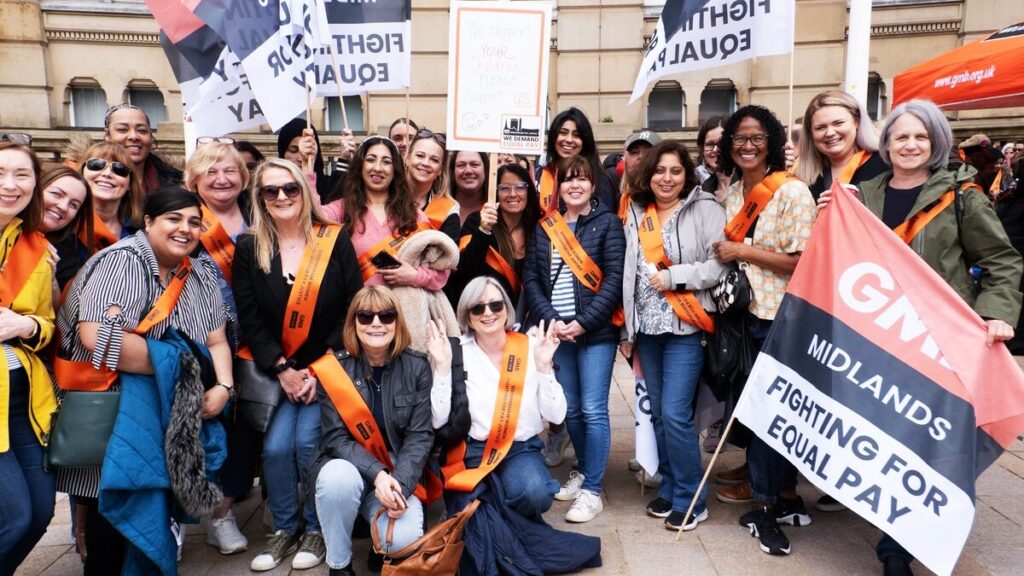Birmingham City Council has agreed to settle a significant equal pay dispute that has been years in the making, ending a long-running battle that was one of the primary reasons the authority declared itself bankrupt in 2023. The agreement will see thousands of low-paid, predominantly female workers finally receive compensation for the long-standing pay inequalities they faced. This breakthrough marks a turning point in the fight for gender pay justice within the council.
The Road to Settlement
The equal pay issue at Birmingham City Council dates back several years, with workers in traditionally female-dominated roles such as teaching assistants, cleaners, and catering staff claiming they had been underpaid compared to their male counterparts in roles like waste collection. The dispute reached a boiling point in 2023, when the council, facing a ballooning £760 million liability for unpaid wages, was forced to issue a Section 114 notice declaring itself effectively bankrupt. This financial crisis stemmed from an audit of historical equal pay claims, which uncovered the massive debt owed to workers.
The settlement, which was announced after intense negotiations, comes four years after the campaign to address these pay disparities began. The GMB and Unison unions, which represent the affected workers, hailed the agreement as a “historic outcome,” noting the tireless leadership of those involved in the campaign. The unions emphasized that this settlement marks a significant achievement in the fight for pay justice.
A Long-Fought Victory for Low-Paid Workers
About 6,000 workers, most of whom are women in traditionally underappreciated occupations relative to male-dominated ones, are anticipated to receive benefits from the settlement. Workers are expected to get compensation in mid-2025, and the unions claim that the settlements will be up to four times greater than the promises made in 2021.

The dispute has been a major issue for the city council, which has had to deal with the financial fallout from its equal pay liabilities alongside other fiscal challenges. These include a £100 million overspend on a new IT system, which exacerbated the council’s already difficult financial situation. The local authority has also had to implement severe service cuts and sell off assets to balance its books.
Despite these challenges, the unions and council have reached a deal that, according to the GMB and Unison, represents a significant step toward “pay justice.” The unions are optimistic that this agreement will send a message to other employers and workers facing similar pay discrimination.
A Historic Achievement for Women Workers
One of the key figures in this victory is Rhea Wolfson, GMB’s head of industrial relations, who praised the dedication of the women who led the charge for equal pay. Wolfson stated that the women involved in this campaign had shown “incredible bravery” in their fight for fairness. They were often told that there was not enough money to compensate them fairly and that they should accept their lower wages. However, these workers did not back down, showing that their labor was essential to the functioning of the council and the city.
Wolfson stated, “We were told for years that there wasn’t enough money to give these workers what they deserved.” “But today, this historic result demonstrates that we can overcome even the most difficult challenges if we have leadership and perseverance.
The settlement is especially significant for women like Pamela Whatley, a teaching assistant from Acocks Green, who has spent four years fighting for fair pay. Whatley expressed her relief and joy upon hearing the news, noting that the settlement will provide her with “peace of mind” and a sense of justice.
Whatley stated, “We’re finally seeing some light at the end of the tunnel, but it’s been a long road.” Although I’m thrilled that our battle is done, the fact that our settlements won’t be seen until the next year makes me sad.
A New Era of Relations
Birmingham City Council leader John Cotton described the settlement as an important milestone in the council’s efforts to recover from its financial difficulties. He acknowledged the hard work and dedication of the unions in securing the deal, saying it marks the “end of an intense period of dialogue” between the council and the unions.
According to Cotton, the council’s development path has taken a significant stride with this framework agreement. It ushers in a new age of forward-thinking and fruitful labor relations based on respect and trust.
The settlement also includes plans for a new pay and grading model within the council, ensuring that pay inequality is addressed once and for all. The council has committed to a job evaluation scheme to prevent such disparities from reappearing in the future.
The Impact on Birmingham’s Future
While the equal pay settlement is a major victory, it comes at a high cost. Birmingham City Council’s financial situation remains precarious, and the council has had to implement one of the deepest rounds of budget cuts in local government history. The £760 million equal pay liability led to the sale of over £750 million worth of council assets, and further cuts are expected to balance the books.
However, the settlement represents a turning point in the council’s efforts to regain financial stability. With the liability finally addressed, the authority can now focus on rebuilding its financial footing, even as it faces ongoing challenges related to service cuts and increased demand for services such as social care.
For those directly impacted by the settlement, such as Claire Shuttleworth, a teaching assistant with over 20 years of experience, the outcome is deeply meaningful. Shuttleworth, who has spent years fighting for fair pay, expressed her relief that the issue was finally being resolved.
I'm delighted to confirm that Birmingham City Council, UNISON and GMB have reached a framework agreement to settle the historic equal pay claims brought by the two unions on behalf of members working for the local authority and Birmingham Children’s Trust. pic.twitter.com/KNtr1SWJyU
— LeaderofBirmingham (@BrumLeader) December 10, 2024Birmingham City Council’s agreement to settle its equal pay dispute marks a historic moment in the fight for gender pay equality. The settlement will bring much-needed relief to thousands of women workers who have been underpaid for years, but it also serves as a reminder of the long and often difficult road to achieving pay justice.
While the financial burden on the council remains heavy, the resolution of the equal pay claims offers a path toward rebuilding trust between the council and its workers, and toward ensuring that such pay disparities do not happen again. As the settlement progresses, many hope this will be a turning point not only for Birmingham but for local government workers across the country who continue to fight for equal pay and fair treatment.
Read More: Storm Darragh Strikes UK and Ireland: One Dead and Thousands Without Power






